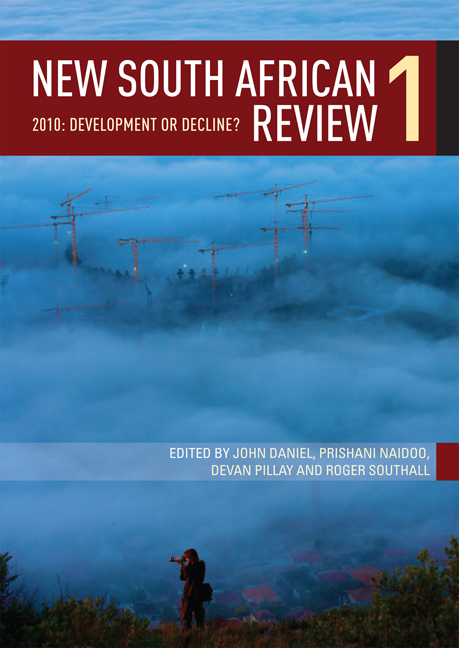Book contents
- Frontmatter
- Contents
- Preface
- Introduction South Africa 2010: From short-term success to long-term decline?
- PART 1 ECONOMY, ECOLOGY AND SUSTAINABILITY
- PART 2 STATE, POLITICS AND POLICY
- PART 3 EDUCATION, HEALTH AND LAND
- INTRODUCTION Reform and redress in higher education, health and land
- CHAPTER 11 ‘Silencing and worse …‘: The humanities and social sciences in South Africa
- CHAPTER 12 Realising transformation, equity and social justice in higher education
- CHAPTER 13 The polarising impact of South Africa's AIDS epidemic
- CHAPTER 14 Health for all? Towards a national health service in South Africa
- CHAPTER 15 The Comprehensive Rural Development Programme (CRDP): A beacon of growth for rural South Africa?
- CHAPTER 16 Breaking down barriers: Policy gaps and new options in South African land reform
- PART 4 Doreen Atkinson
- Contributors
- Index
CHAPTER 14 - Health for all? Towards a national health service in South Africa
from PART 3 - EDUCATION, HEALTH AND LAND
Published online by Cambridge University Press: 21 April 2018
- Frontmatter
- Contents
- Preface
- Introduction South Africa 2010: From short-term success to long-term decline?
- PART 1 ECONOMY, ECOLOGY AND SUSTAINABILITY
- PART 2 STATE, POLITICS AND POLICY
- PART 3 EDUCATION, HEALTH AND LAND
- INTRODUCTION Reform and redress in higher education, health and land
- CHAPTER 11 ‘Silencing and worse …‘: The humanities and social sciences in South Africa
- CHAPTER 12 Realising transformation, equity and social justice in higher education
- CHAPTER 13 The polarising impact of South Africa's AIDS epidemic
- CHAPTER 14 Health for all? Towards a national health service in South Africa
- CHAPTER 15 The Comprehensive Rural Development Programme (CRDP): A beacon of growth for rural South Africa?
- CHAPTER 16 Breaking down barriers: Policy gaps and new options in South African land reform
- PART 4 Doreen Atkinson
- Contributors
- Index
Summary
At its landmark conference in Polokwane in December 2007, the African National Congress (ANC) adopted a resolution to implement a National Health Insurance (NHI) as part of a broader ten point plan to address the key challenges facing the health system.
In the Government Gazette of 11 September 2009, Health Minister Aaron Motsoaledi established a ministerial advisory committee to advise on the development of policy, legislation and implementation of the NHI. The Gazette declares: ‘The introduction of a National Health Insurance System is founded on three principles. Firstly, that it is a Constitutional right that the public has access to affordable and acceptable quality health services; secondly, that it is the responsibility of the State to ensure the progressive realisation of the right to health for all South Africans that is premised on the objective of universal coverage; and thirdly, that it is important for health services to be funded in an equitable manner that promotes social solidarity’ (Department of Health 2009).
Motsoaledi said the committee would release a draft white paper on the NHI for public comment in due course but by mid-March 2010 the white paper had not been released, and very little is known about the proposed NHI apart from the three fundamental principles outlined above.
The available information indicates that the NHI will pool all the money currently spent on health into a single National Health Insurance Fund (NHIF). This includes money allocated through the health budget, together with a ‘mandatory contribution’ from everyone over a certain income threshold. The mandatory contribution will increase progressively according to income but the unemployed and those below a defined income threshold will be exempt. The NHIF will pay for all health care services in South Africa. Citizens and permanent residents will be able to choose either a public or a private health care facility. There will be no user fees or co-payments for health care (Department of Health 2009).
The rationale for the NHI is made clear in the Gazette: ‘The South African health care system is … fragmented and inequitable … due to … huge disparities … between the public and private health sectors with regards to the accessibility, funding and delivery of health services […]
- Type
- Chapter
- Information
- New South African Review2010: Development or Decline?, pp. 326 - 343Publisher: Wits University PressPrint publication year: 2010

